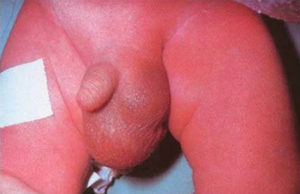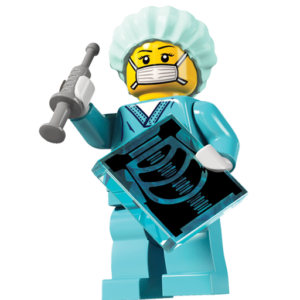Inguinal Hernia in a Boy....What is it?

An Inguinal Hernia is a connection between the tummy and the scrotum. Your son was born with this connection.
Before he was born, the connection was a tube (processus vaginalis) that was created to help the testicle travel from inside the tummy, where it develops, through the inguinal canal, down into the scrotum.
In the majority of boys this connection disappears by itself. In a minority this tube does not disappear. If fluid travels down the tube it can cause a collection of fluid around the testicle - called a hydrocele.If the connection contains gut, it is called a hernia.
How will it affect my son?
You will see the hernia as a swelling in his groin. This swelling can go all the way down to the scrotum. Typically the swelling can come and go. You may not always be able to see the hernia, but the connection is still there.
You are more likely to see the swelling when your son is crying or straining to poo. This is because both of these push the hernia out. Just because the hernia is out when your son cries, does not mean that your son is in pain. If the hernia goes in and out, or is soft, then there is nothing to worry about.
In some rare cases the hernia can become stuck (You may hear somebody call this an incarcerated hernia or an irreducible hernia). If the hernia is stuck you may see that:
- •The hernia will not go back in
- •The swelling becomes hard
- •The swelling becomes red and tender.
A stuck hernia can interfere with the blood supply to the testicle on the side of the hernia. If the hernia is stuck you need to get a doctor to see your son urgently, because they may need treatment. The doctor will tell you about any treatment that is needed when they see your son.
Could the swelling be something else?
There are a number of other conditions that are occasionally mistaken for inguinal hernias.
These include:
- Hydrocele. If fluid goes through the connection between the tummy and scrotum it may accumulate around the testicle on the same side that can spread up the groin. It can be mistaken for a hernia.
- Undescended Testicle. A testicle that is in the groin rather than the scrotum can occasionally be mistaken for a hernia. Most often it is mistaken for an incarcerated or stuck hernia.
- Femoral Hernia. Femoral hernias are very rare in children. If one occurs it can be very difficult to tell the difference between a femoral hernia or an inguinal hernia.
- Lymph Node. Lymph nodes are glands that are part of the body’s immune system. They can get bigger if the body is fighting an infection. Occasionally glands can come up in the groin and be mistaken for an inguinal hernia.
Does my son need any investigations?
In most cases it is possible to make a diagnosis after taking a careful history and examination. Investigation are not normally necessary.
In some uncommon cases it may be necessary to organise an investigation to find out exactly what is happening. The most common investigation used is an ultrasound scan (or ‘jelly on the belly’ scan).
How are Inguinal Hernias treated?
An Inguinal hernia will not get better by itself. An inguinal hernia is fixed by an operation called an Inguinal Herniotomy.
There is no medication that can be given to cure an inguinal hernia
If a hernia becomes stuck (becomes hard, red, tender and not going back in by itself), it is important that the hernia is Reduced (put back inside) as soon as possible. This is because a stuck hernia can cause problems with the blood supply to the testicle on the same side.
If you are worried that a hernia has become stuck then you should take your child to your family doctor or to the Emergency Department straight away.
Will this have an impact on my son long term?
Generally there is no impact on long term health once a hernia has been treated.
If the hernia was stuck (incarcerated) there is a small risk of the testicle on that side not surviving despite surgery to fix the hernia. This is because the blood supply to the testicle is affected when the hernia becomes stuck out. Unfortunately if this happens there is nothing that can be done to treat it or save the testicle.
WHEN TO SEEK URGENT HELP
YOU SHOULD SEEK URGENT HELP FROM YOUR FAMILY DOCTOR OR TAKE YOUR SON TO ED IF:
- The Hernia becomes stuck
- The Swelling becomes hard
- The swelling becomes tender and red
Inguinal Herniotomy Information
Inguinal Herniotomy is the name of the operation to treat an inguinal hernia in a child.
Click the button below to find out more information about this procedure.
The information provided in this information leaflet is meant to provide general information only. It does not replace a consultation with a doctor who will be able to give you information tailored to the patient.

